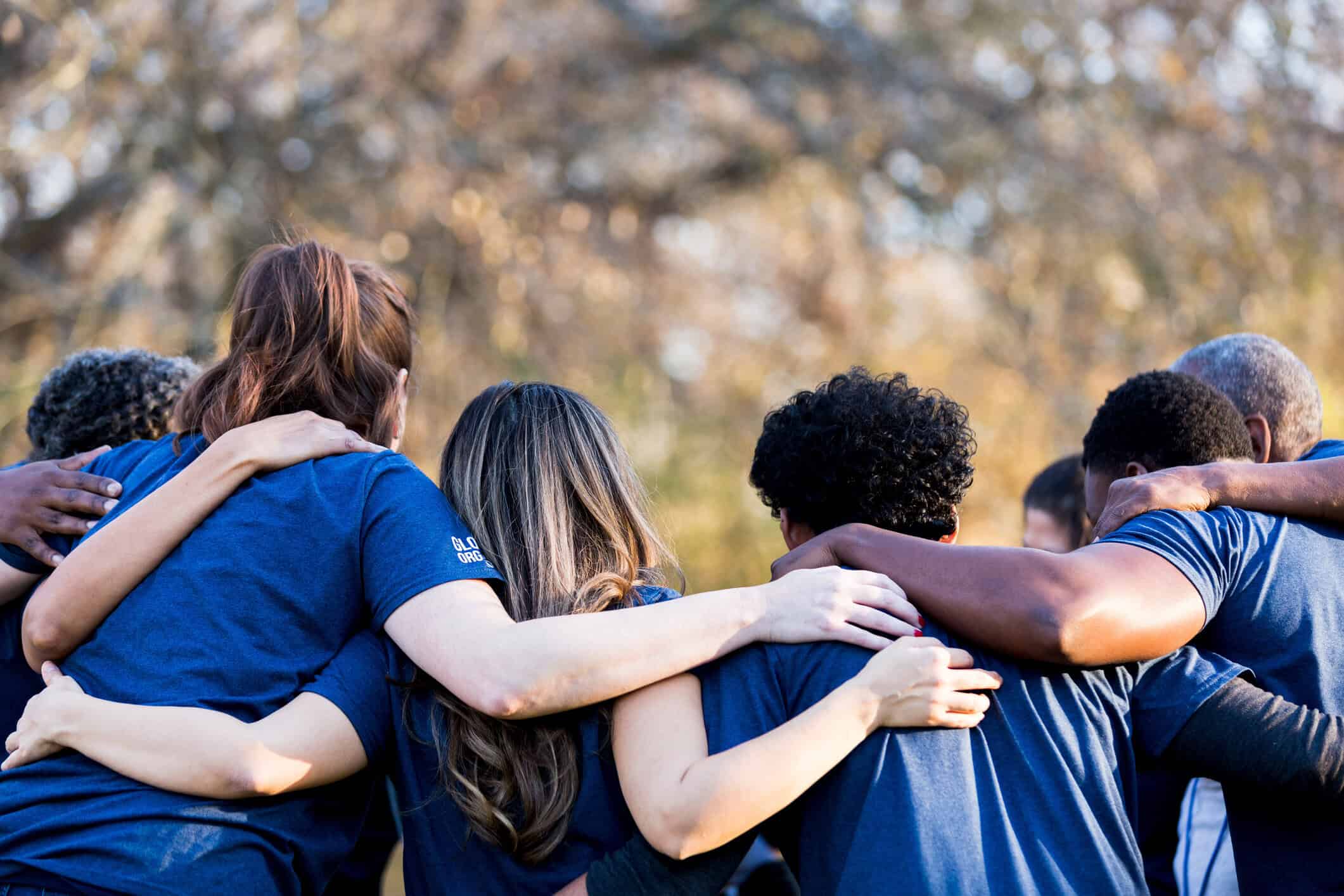Accountability and accountability groups have been buzzwords for a while. But it’s for good reason. When done right, accountability can completely change your life.
“I struggled on and off with looking at porn for 40 years,” recounted John Doyel. “When the internet and the phone in my pocket made it easy to access porn at any time, it did not take long for me to become addicted.” He went on to explain:
“My addiction was uncovered because I was accused of having an affair with another woman in the church. I was so sick of myself and my absolute failures to stop. I was ready to reveal everything to my wife and our four adult kids and put everything into God’s hands. If the pieces could be put back together again, it would have to be Him doing it.
It did not take me long to realize that if I was going to recover from my sex addiction, I needed help. A lot of help.
The lesson I have learned and taught over and over again is: recovery must happen in community. Put another way, a lone sheep is a dead sheep!”
An addiction like pornography is only one example. Whatever your goal, accountability can play a crucial role in your success. Some people use “self-accountability” systems to measure their progress on particular goals or behaviors they are looking to change. But if you’re struggling to change your behaviors, accountability groups are one of the most powerful resources available.
What’s an Accountability Group?
An accountability group is a gathering of like-minded people who keep one another accountable, usually for a particular goal or related to a particular behavior. At Covenant Eyes, we’ve worked with many people who find success through 12-step sex addiction groups.
Some established accountability groups have charters and bylaws. Alcoholics Anonymous and other 12-step programs fit into this category and usually meet in person. Nowadays, you can also find many similar groups online. However, some groups have less formal organization and are simply groups of people who come together for mutual encouragement.
Why Are Accountability Groups Useful?
Why do accountability groups work? What makes them useful for accomplishing goals and overcoming roadblocks? How do they provide different support than an accountability partner who meets with you one-on-one?
1. Everyone needs people.
Even the most introverted among us need companionship. Humans are social creatures. Research shows we don’t do well with isolation. Every one of us needs social connections and authentic relationships. We need to be engaged in communities where people know us for who we are and love us. An accountability group can provide a different type of support than just an accountability partner because you’re not as dependent on one person, and you gain the perspectives and support of all who attend.
2. Accountability groups unite people in a common cause.
12-step groups are powerful because they bring together a group of people with a common purpose and goal. Each member understands the challenges and pitfalls they face, and they support each other on the path to sobriety. But accountability groups offer value beyond dealing with addiction.
In the book Creativity, Inc, Pixar CEO Ed Catmull talks about group accountability and a common cause as the creative fuel for Pixar’s remarkable success. He called his key accountability group “The Brain Trust,” and members of the group would freely exchange ideas and critiques. The common cause of the group pulled the members together and brought the best out of everyone–with legendary results.
3. Accountability groups provide peer motivation.
Having a group of like-minded people is a tremendous incentive to follow through with your goals. Knowing that your group will be checking in on you may provide the extra motivation to stay on track. Your victories are all the more satisfying when you can celebrate them in a group of like-minded people!
4. Accountability groups are a safe place for admitting failures.
Shame can be paralyzing. Many people trapped by unwanted behaviors find themselves spiraling deeper and deeper into shame and secrecy because they can’t be honest with anyone. They think that admitting you failed means you are a failure (which isn’t true!).
An accountability group is a safe place for admitting your failures. An accountability group crushes shame because you’re surrounding yourself with people who love you even though they know about your failures. They can remind you who you are, so you can keep going after your goals.
Why Do Accountability Groups Fail?
Despite the value of accountability groups, many become ineffective and useless. I’ve heard some people complain that their experiences in accountability groups actually made them less effective in reaching their goals. Perhaps you’ve experienced a group like this.
What goes wrong? At least four problems can derail an accountability group and undermine its effectiveness.
1. Group meetings are sporadic and inconsistent.
This should be fairly obvious, but an accountability group is bound to fail if the group never gets together. Depending on the purpose and nature of the group, you may not need to meet every week–once a month may be sufficient.
Regardless of the frequency, if you end up canceling as many meetings as you hold, it’s going to be unhelpful.
2. Groups are programmatic and inauthentic.
Most groups work best with an established format and routine. However, if the group is too formal it’s easy to become a perfunctory routine. Group members may go through the motions, but they’re just checking off boxes on a list.
This kind of accountability group is rarely effective because it’s inauthentic. Remember, we said the value of an accountability group was that it provided a safe place where people knew your faults and loved you anyway? That requires a high level of authenticity. This usually won’t happen if folks just follow a script.
3. Groups are performance-based and legalistic.
Some accountability groups find themselves split into two subgroups: the winners and the losers. The winners are the ones who are crushing their accountability goals. Every week the winners show up and proudly recount their successes. The losers are missing the mark, and with each successive triumph of the winners, they get pushed lower and lower into defeat. Sadly, this can happen with accountability in church.
Instead of mutual encouragement, these groups create rivalry and tension. While that can work in some settings, it’s rarely helpful for the people most in need of accountability.
4. Groups are merely confessional and enabling.
The converse tendency to performance-based and legalistic groups is confessional and enabling groups. Confessional and enabling groups are those where people come and freely share their failures–week after week. Again and again.
To this group’s credit, it’s not legalistic. But it gets depressing quickly as people return again and again with the same unmet goals. It’s not helping anyone, and people eventually quit.
What Makes a Successful Accountability Group?
We looked at what causes accountability groups to fail. But what are the hallmarks of a successful group? What do you need to do to make it happen?
1. Clearly establish the group’s purpose.
You need to ensure you’re clear on the group’s purpose. Is this group for recovering alcoholics, like AA? Is this for weight loss or diet? Is it a group for quitting porn? Is it to improve your presentation skills or work on your side hustles?
We noted there are formal and informal groups. You don’t necessarily need to establish a group charter or bylaws. But these can certainly help, especially if your group is growing or spread out geographically. Regardless, everyone in the group should clearly understand what the group is and isn’t for.
2. Format the group to support conversation.
It’s important to have a routine for your group to follow, especially in the beginning if people don’t know each other well or the accountability group is for something uncomfortable–like quitting porn.
You need to have someone lead the group. You might have one individual who leads the group every time, or you might have a rotation of group leaders. The important thing is that there’s someone who has accepted the role of officiating the meeting and keeping it on track.
A highly formal accountability group might use Robert’s Rules of Order to ensure orderly meetings. You don’t need to go this far. 12-step programs have a less formal meeting guide that is perfectly suitable for their needs. The Samson Society has its own meeting book, with a recommended meeting format and some guidelines for what to include.
3. Maintain a non-judgmental atmosphere.
One of the keys to authentic community is a non-judgmental atmosphere. Your accountability group should be a safe place for honesty, including failures.
We saw how a focus on performance or failure can undermine the group. The key to this staying focused on positive feedback and solutions.
How Do You Find an Accountability Group?
The great thing about the internet is that you can now find accountability groups for just about anything! Of course, if you can find a group where you meet in person, that’s even better.
- Some churches encourage accountability. Check if see if churches in your area have an accountability group related to your area of interest.
- Look on meetup.com or a similar site for a list of accountability groups of all kinds.
- Check out our friends at The Samson Society if you’re a Christian man wanting to quit porn
6 Simple Steps to Start an Accountability Group
Anyone can start an accountability group! You need two or three other like-minded people and you’ll be on your way. After this, it’s a matter of implementing the hallmarks of successful accountability groups in your group.
Now, down to the nitty-gritty details. To start your accountability group, I recommend the following:
1. Write up a group mission statement.
Remember one hallmark of a successful group is a clearly established purpose. Writing a group mission statement is a great way to do this.
It should be short–preferably just one sentence. This will be the anchor that keeps your group on track. You may need to update it later, but it’s good to start with something.
2. Decide your group format.
This can be very minimal, but you should have something in place. If you’re going to start from scratch, you might consider something like the following format:
- Introduction and statement of group’s purpose
- Review of discussion guidelines (e.g. many groups have rules against interrupting other members)
- Individual accountability reports
- Closing
Flexibility is important to allow for authentic conversation to take place. You’ll need to manage this tension between too much and too little structure. However, it’s generally advisable to keep things less formal to make members comfortable.
3. Pick a group moderator.
The free-for-all format might work with a smaller group of people who know each other well. However, it’s very easy for an accountability meeting to get derailed if there isn’t a designated moderator. Generally, it’s good to have one person responsible for facilitating the meetings.
The moderator should be able to keep things on track and make sure everyone gets to talk. However, the moderator should also be sensitive to situations where one individual may need more time to go deep on a particular subject.
4. Select a reporting metric.
We already talked about the importance of a common goal for your accountability group. But it’s also important to have a way of tracking and reporting progress.
In the best-selling book Measure What Matters, John Doerr talks about the importance of both having goals (what you’re trying to do) and tangible metrics for evaluating them (how you’re going to do it).
Nowadays, exercise apps have built-in accountability features where you can share your progress with friends. In a writing accountability group, each member usually brings their work to share. At Covenant Eyes, we provide accountability reports for people who want to quit porn.
5. Find a time and place that works.
You can meet in person or online. You can meet weekly, bi-weekly, or even monthly. Your circumstances will determine the best location and frequency of the meetings. However, it’s important to have a degree of consistency.
6. Start talking!
If all this seems daunting, don’t worry. The basic premise of accountability groups is simple: a group of like-minded people who get together and talk.
How have accountability groups worked for you?
If you’ve been a part of an accountability group before, we’d love to hear about it!
Comment below and let us know the purpose of your group and how it helped (or didn’t help) you achieve your goals. Your tips and tricks may be the inspiration someone else needs.








I haven’t been part of an accountability group but my boyfriend has. We are both sex addicts. He never shared specific details about his group but from everything I heard, he didn’t see much, if any, recovery – and it fit exactly your criteria for a successful group.
Accountability hasn’t worked for either of us, or for others we know. Accountability just increases shame – it doesn’t lead to healing.
The support groups (12-Step) we now go to, however, have a very high success rate. Why don’t you recommend going to one of them instead of re-inventing the wheel?